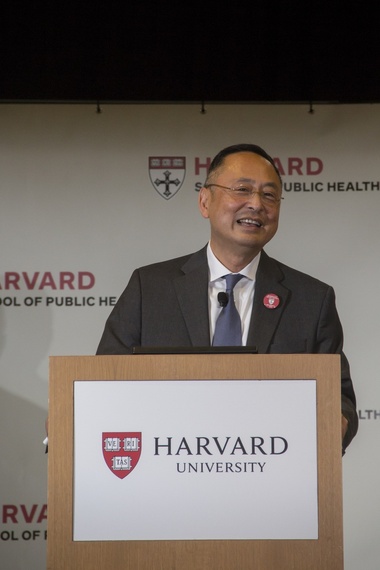When I read The Harvard Crimson Staff Writer Matthew Q. Clarida's headline, "School of Public Health [HSPH] Renamed with $350 Million Gift, Largest in Harvard History," I thought that perhaps the donation was made by someone like Tom Steyer or Bill Gates, as a means to accelerate knowledge of how human health is impacted by global climate disruption. It so happens that 350.org, the student-led climate action organization pioneered by Harvard graduate Bill McKibben, advocates for a 350 parts per million limit on atmospheric concentrations of carbon dioxide. And, my reasoning continued...it would make sense that one of the world's leading academic research institutions be entrusted to take the lead in exploring, among other things, the best strategies for adaptation in the face of a rapidly heating planet. The growing threat to human health is only punctuated by the United Nations' secretary general Ban Ki-moon summoning world leaders to New York City in two weeks to negotiate parameters for a global climate agreement aimed at lowering greenhouse gas emissions by the end of 2015.
As it turns out, however, the reference to "350 million" in Clarida's headline had nothing to do with either Harvard's interest in solving the global climate conundrum or Harvard alum Gerald L. Chan's record-breaking financial pledge. Nevertheless, my misunderstanding begs an important question at this time in evolutionary history: Will Harvard's Management Company, tasked with growing Harvard's endowment, acknowledge the critical state of the planet and direct a portion of Chan's gift to building the kind of intentional financial partnerships that lead to a more stable climate and a more manageable global health ecosystem?
It warrants noting that pandemics, such as those already targeted for further research by the HSPH before Chan's gift was announced, will only challenge global health resources further, unless colleges and universities, non-profits, industry, political leaders and philanthropic organizations work together to lower the Earth's thermostat.
Stanford University recently responded to the issue of planetary warming by divesting its endowment from coal mining and coal-fired electrical power generation operations.
Stanford President John Hennessy publicly acknowledged that the coal industry's deleterious impacts on human health and the environment--everything from black lung disease and rising rates of childhood asthma to worldwide habitat loss, species extinction and ocean acidification--were key motivations for the University's decision to divest.
With a bright light now shining on Harvard's School of Public Health, it's an opportune moment for Harvard to reassess its endowment distribution and consider whether the investments made to date align well with Harvard's academic, social and leadership goals. More directly, do they support the public good, and if not, are there other equally compelling, socially responsible investments that can deliver comparable or even better returns?
If the HSPH, as Chan believes, is indeed in the business of educating students to solve the world's greatest human health challenges, then divesting from coal and other fossil fuels that are threatening global health makes sense. Divestment from coal and fracked natural gas, for example, pave the way for exciting new business models to replace old ones. Since the writing of my February 21, 2014 Huffington Post article entitled, "Clean Energy Powers College and University Endowments," shares of Solar City (SCTY), Tesla Motors (TSLA), Sun Power (SPWR) and Canadian Solar (CSIQ) have only continued to rise. As of September 8, 2014, these stocks were up a remarkable 409 percent, 734 percent, 425 percent and 1,159 percent, respectively, since January, 2013.
The Harvard Management Company may want to consider investing a portion of Chan's $350 million pledge in these and other clean energy businesses that are driving the 21st century's distributed clean energy renaissance. Solar, wind and water-powered electricity generation, electric vehicles and affordable energy storage solutions are society's best bet for protecting public health worldwide. Pairing Chun's gift with the new energy plays that are rewarding investors today would enable Harvard to shift course to meet the needs of an increasingly complicated and fragile world, while also growing its endowment handsomely over time.

